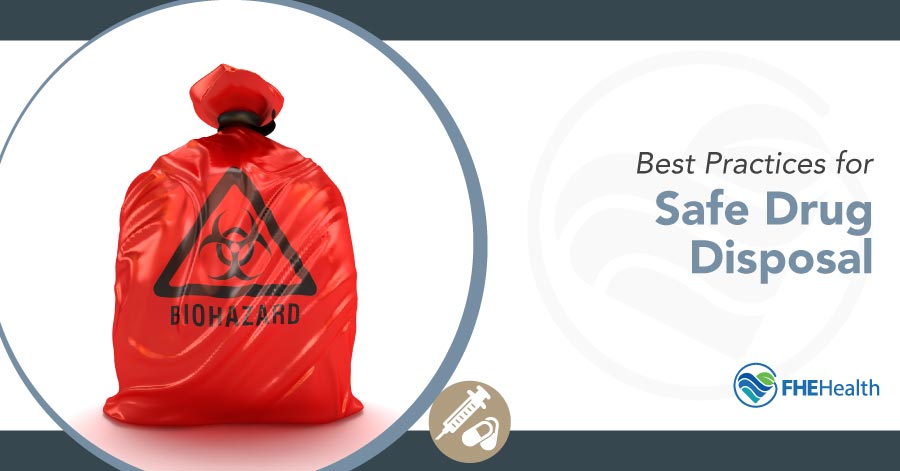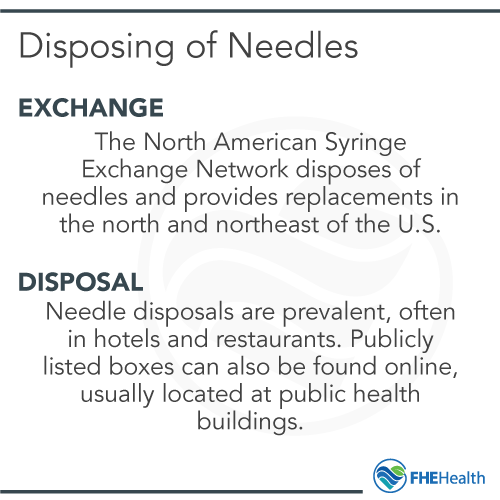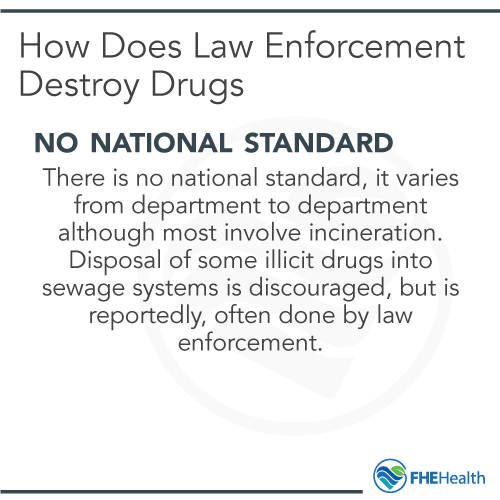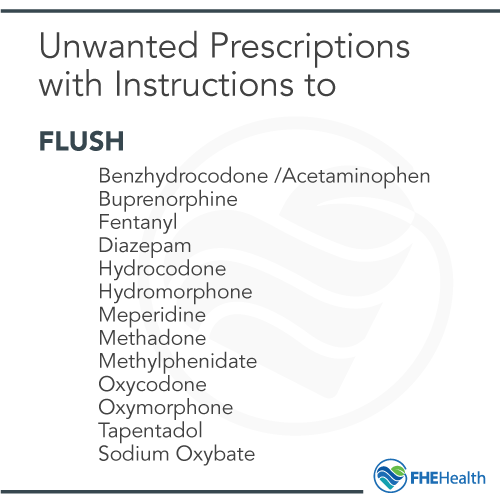
Once someone has decided to get clean and start down the road towards recovery, one of the most important things they need to do right away is ditch any drugs they’re still holding. This step is critical because there’s simply nothing good that can come from holding on to the stash in your medicine cabinet.
Along with ditching the drugs, they’ll also need to get rid of all drug paraphernalia. Depending on their drug(s) of choice, this could mean clearing everything from rolling papers to pipes, tin foil, lighters, and razor blades. If they’ve been injecting, they also need to dispose of their rig and spoons, while common items like straws, aerosol cans, and even hair clips might need to go as well.
In a nutshell, if it’s an item that the individual associate with drug use, they need to get rid of it. How they do that depends mainly on their drugs, where they live, and what options are available to them.
How to Dispose of Drugs — The Kitty Litter Method
 The primary goal is to dispose of the illegal drugs in a way that prevents the individual or anyone else from using the drugs to get high while also protecting against accidental exposure.
The primary goal is to dispose of the illegal drugs in a way that prevents the individual or anyone else from using the drugs to get high while also protecting against accidental exposure.
The individual should render the drugs completely useless. In many cases, the absolute best way to do this is by burning the stash; however, unless the person lives on a farm or large property where they have access to a burn barrel or fire pit, incineration likely isn’t an option. Don’t attempt to burn the drugs in a barbecue, either—it’s simply too dangerous.
Another option is to flush the drugs—this works for pills and powders, but it also means the person could risk a contact high, especially if they’re dealing with fentanyl, cocaine, or unknown substances. Do not flush packaging, such as baggies, down the toilet.
Next to high-heat incineration and flushing, the most widely recommended and practical method of drug disposal involves mixing the drugs with kitty litter in a large, zip-style plastic bag. Ideally, the kitty litter will be well-used since it will make opening up the bag highly unappealing for anyone and render the drugs completely useless.
Triple-bag the kitty-litter/drug baggie, then place this in yet another bag that can be tossed in a dumpster, sidewalk garbage bin, or even the household garbage. This means that the individual won’t have to worry about getting caught transporting the drugs to a secluded drop-off site or taking them out to the woods to be incinerated.
Some online message boards also suggest combining unwanted drugs with used coffee grounds. However, that’s not a good idea if there is a risk of exposing unsuspecting gardeners to drug-laced compost.
Proper Disposal of Weed
Weed contains THC, a powerful psychoactive compound that gives users their “high.” THC can be dangerous if it’s ingested by children or animals, which is why an individual shouldn’t dispose of marijuana like regular trash. States in which recreational or medical marijuana is legal generally have their own guidelines on the best way to dispose of unwanted weed. Generally, it’s recommended that individuals grind it and mix it with other solid waste like food, soil, paper, plastic, or cardboard at a 1:1 ratio. Then the individual should place the mixture in an opaque container and dispose of it in the trash can.
Proper Disposal of Heroin
Whether it’s in powder form or it’s dissolved in water, heroin should be mixed with solid material like used kitty litter or dirt. Then, the individual can put the entire mixture into a container, seal it, and then dispose of it in the trash.
Heroin that’s in tablet or capsule form can be disposed of in drug disposal bags, which are available at most local pharmacies. The individual simply puts up to 15 pills into the bag, which contains active carbon, and then adds water. The carbon binds to the pills and breaks them down. Then, they can throw the sealed bag into the trash.
Where to Dispose of Needles and Paraphernalia
Nobody wants to get stuck with a dirty needle. Thankfully, you can find needle disposal boxes in public bathrooms, malls, hospitals, and many restaurants where they’ve been installed to provide diabetics with a safe drug disposal location to throw out their insulin needles. This can be a good option if there are only a few needles to deal with.
An online search at The North America Syringe Exchange Network, or NASEN, provides a list of syringe exchange programs in a given area that accepts used needles.
And as with the drugs, disposing of drug paraphernalia by either smashing and burning it or combining it with used kitty litter, then tossing it in the trash, is the best bet. If someone can’t access a needle disposal box, they should be sure to break off the needle tips using a set of pliers and wrap them along with other sharp objects like broken glass in a thick paper towel before mixing everything with kitty litter. Needles can also be discarded in sturdy-lidded, opaque containers that can’t be punctured, such as shampoo bottles and laundry detergent or cat litter jugs.
Proper Disposal of Cocaine
Cocaine is generally sold in powder form, making it easy to mix into the dirt, used kitty litter, or any other solid that would make it unappealing and unusable. As with other drugs in powder form, cocaine should be mixed with other solid materials to make it unrecognizable and useless. The entire mixture should be placed in a sturdy container and disposed of in the trash.
How Law Enforcement Officials Dispose of Illegal Drugs
 In 2019, the U.S. Customs and Border Protection agency seized nearly 290,000 pounds of marijuana, almost 90,000 pounds of cocaine, and about 5,400 pounds of heroin. All of those drugs—and the ones obtained by other law enforcement agencies across the country—are eventually destroyed by incineration.
In 2019, the U.S. Customs and Border Protection agency seized nearly 290,000 pounds of marijuana, almost 90,000 pounds of cocaine, and about 5,400 pounds of heroin. All of those drugs—and the ones obtained by other law enforcement agencies across the country—are eventually destroyed by incineration.
In the United States, there is no national standard when it comes to illegal drug disposal. Although there are federal standards regulating incineration of pharmaceuticals, those rules don’t apply to contraband substances.
According to DEA Special Agent Rich Isaacson, the agency destroys any marijuana it seizes at EPA-approved, government-contracted incineration facilities. At the same time, other illicit drugs are burned in-house at DEA labs throughout the country.
In most cases, the burns are controlled to prevent fumes or residue from being released into the community. Law enforcement has used hospital incinerators, foundries, and crematories to dispose of illegal drugs. However, some companies have expressed concern that allowing their equipment to be used for drug disposal could affect the quality of their product or skew employee drug tests.
Smaller police departments don’t have access to the high-temp incinerators found at medical waste facilities and steel manufacturing plants. In Pennsylvania, the state police own a small incineration unit, while in West Virginia, some law enforcement officials simply destroy illegal drugs in open fire pits and burn barrels.
What the FDA Says About Safe Drug Disposal

The abuse of prescription opioids, stimulants, and sedatives is a serious public health problem in the United States. According to a 2017 study conducted by the National Institute of Drug Abuse, about 18 million people misused prescription medications within the previous year. About 14.4 percent of young adults (ages 18-24) and nearly 5 percent of adolescents (ages 12-17) reported nonmedical prescription drug use in 2017. Reasons for prescription drug misuse can vary according to factors like age and gender, but ease of access is a significant reason.
Promptly disposing of unused medicine when they’re no longer needed is the best way to reduce the likelihood of those drugs being misused.
While the federal government doesn’t have guidelines for disposing of unwanted street drugs, the U.S. Food & Drug Administration does advise that “a small number of medicines have specific instructions to immediately flush down the toilet when no longer needed and a take-back option is not readily available.”
The prescription medications that the FDA endorses flushing include:
- Fentanyl (orally administered), including Actiq and Duragesic
- Diazepam
- Hydrocodone (Vicodin, Norco and Vicoprofen)
- Hydromorphone (Dilaudid)
- Methadone and morphine
- Oxycodone and oxymorphone (Percocet, Percodan, and Opana)
The DEA sponsors biannual National Prescription Drug Take-Back Days with over 5,800 collection sites throughout the country, including 133 right here in the Sunshine State. The stated goal of this biannual event is to help keep unused medicine out of the hands of drug dealers and unauthorized users, and since being launched in 2010 it’s collected over 10 million pounds of meds.
The agency also maintains a searchable database of controlled substance public disposal sites (mostly pharmacies) where someone can turn in extra prescription meds year-round. It’s important to know that only prescription and over-the-counter drugs are accepted at DEA-endorsed events and locations.
Some counties and states also sponsor Medication Take-Back programs; however, these largely exclude illegal drugs as well. In Colorado, where recreational marijuana is legal, marijuana isn’t accepted for permanent disposal through the state drug collection program.
An Alternative to Flushing Medications
Many environmental groups disagree with the federal government’s stance on flushing drugs.
The Florida Department of Environmental Protection states, “Although this method of disposal prevents immediate accidental ingestion, it can cause contamination in our aquatic environment because wastewater treatment systems, including septic tanks, are not designed to remove many of these medications.”
Instead of flushing medications, the department recommends that people disposing of habit-forming medications with these steps:
- Dissolve pills in water or a carbonated drink and mix liquids with an inedible substance like dirt
- Place the bottle in a non-see-through container like a coffee can
- Place the container in the trash can, remembering to mark out personal information like the user’s name, home address and the prescription number
Throwing Medications Away
The FDA recommends only flushing prescription medications when take-back options aren’t readily available. It recognizes that there is a chance that these drugs could have a negative impact on the environment and there’s a risk of them contaminating water supplies. However, the FDA states that storing these drugs where they may pose a hazard to household members outweighs the negligible risks associated with flushing.
Individuals who need to get rid of medicines that aren’t on the FDA’s flush list, such as expired antibiotics, can follow these steps to safely dispose of medicines in their household trash can:
- Remove all personal information from the prescription label on the empty medicine packaging, then dispose of it in the trash
- Mix the medicines with substances like cat litter, dirt or used coffee grounds to make it less appealing to pets, children or anyone who may intentionally go through the trash
- Place the mixture in a sealed plastic bag
- Discard the bag in the trash can
What About Amnesty?
In an ideal world, an individual could surrender their illegal drugs and drug paraphernalia with amnesty to the authorities without question or fear of reprisal. Unfortunately, possession of any illegal drugs, including prescription drugs that belong to someone else, could put an individual on the wrong side of the law.
While some localized and event-specific amnesty programs exist—such as the “amnesty boxes” used to collected banned items and substances at the Coachella Valley Music and Arts Festival in California—there is no national amnesty program in the United States.
Whether or not someone is charged with possession is largely left to the discretion of local law enforcement agencies and individual officers—that’s why discretion is advised when disposing of drugs.
Ready to Get Clean? Call FHE Health
When you’re ready to get well, we’re here for you. Our compassionate addiction specialists are standing by 24 hours a day, seven days a week to answer your call and reply to your online messages—contact us here.






